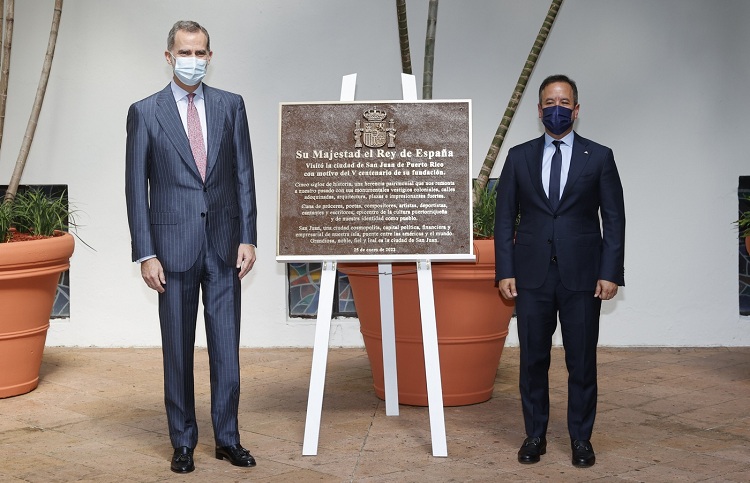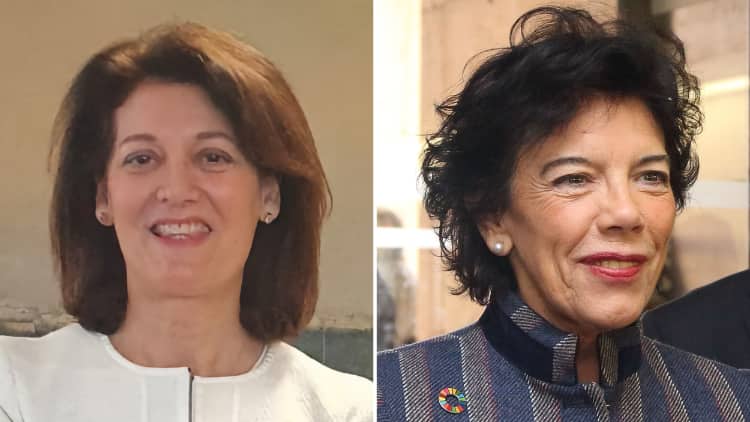The Diplomat
King Philip VI defended yesterday in Puerto Rico the role of Spain during the colonial period in America, in which “brought with it its language, its culture, its creed” and contributed “values and principles” that served as “bases” for “international law or the conception of universal human rights”.
The Monarch traveled to Puerto Rico on the occasion of the celebration of the fifth centenary of the founding of the city of San Juan and today will travel to Tegucigalpa (Honduras) to attend the inauguration of President-elect Xiomara Castro.
The King, who is traveling accompanied by the Minister of Industry, Trade and Tourism, Reyes Maroto, and the Secretary of State for Foreign and Global Affairs, Ángeles Moreno, arrived Monday afternoon (night in Spain) at the San Juan airport, where he was received by the governor of Puerto Rico, Pedro Pierluisi; the mayor of San Juan, Miguel Romero; the Secretary of State, Omar Marrero; the Spanish ambassador to the United States, Santiago Cabanas; and the Spanish consul on the island, Josep Bosch; among other authorities and personalities.
Later, the King went to the Casa de España, where he held a meeting with a representation of Spanish residents on the island. The Spanish community in Puerto Rico is made up of about 8,000 people, including several long-standing entrepreneurs on the island (some companies are already in their third and fourth generation of Spaniards at the helm) and a group of religious dedicated, above all, to education and the most disadvantaged groups.
Philip VI began yesterday with a meeting with Pedro Pierluisi, to whom he presented the Grand Cross of the Order of Isabella the Catholic. The meeting took place at the Santa Catalina Palace, also known as La Fortaleza, the current official residence of the governor of Puerto Rico, which was built between 1533 and 1540 to defend the port of San Juan de Puerto Rico. La Fortaleza was declared a World Heritage Site by UNESCO in 1983.
After the meeting, the King walked to the Convent and Casa de la Salud de las Siervas de María, where he greeted the Sisters of the Congregation, and then walked to the Casa de la Alcaldía (House of the City Hall), where he met with Miguel Romero, to whom he also presented the Grand Cross of the Order of Isabella the Catholic. For his part, the Mayor presented Philip VI with the Key to the City.
After the Mayor’s speech, the King said a few words in which he recalled that “Spain brought with it its language, its culture, its creed; and with all this it contributed values and principles such as the foundations of International Law or the concept of universal human rights”. These are “concepts and elements that contributed in a very important way to the beginning of the Modern Age from institutions such as the School of Salamanca, made up of jurists, academics and religious”, he added.
The ceremony was held in the Chapter House of the City Hall and was broadcast live for all of Puerto Rico and the East Coast of the United States, and ended with the unveiling by the King of a plaque commemorating the 500th anniversary of the founding of San Juan de Puerto Rico. Hours before the King’s arrival on the island, several unknown persons knocked down the statue of Juan Ponce de León, Puerto Rico’s first governor, in Old San Juan, the historic center of the Caribbean capital.
Business meeting
At mid-morning, the King moved to the Sheraton Puerto Rico Hotel, where he inaugurated a Puerto Rico-Spain Economic and Business meeting, in which he was accompanied by the governor of Puerto Rico and the mayor of San Juan and in which several round tables were held, with the participation, among others, of the president of the CEOE, Antonio Garamendi; the president of the Spanish Chamber of Commerce, José Luis Bonet; and the secretary of State of Puerto Rico.
After the round tables, the King said a few words in which he emphasized that “Spanish businessmen have always considered Puerto Rico a place of encounter, fraternal and friendly”, where “they can have a first experience with the U.S. regulatory and normative context, in a Spanish-speaking country with a great cultural affinity, something that was, and is, decisive to facilitate to a large extent the process of internationalization of our companies on the other side of the Atlantic”.
After the business meeting, the monarch attended an exhibition on Juan Ramón Jiménez at the Puerto Rico Tourism Company, visited the Museum of San Juan -where he toured with the mayor the exhibits as part of the celebration of the 500th anniversary of San Juan- and presented Romero with the founding documents of the city of San Juan. The day concluded with a state dinner.







